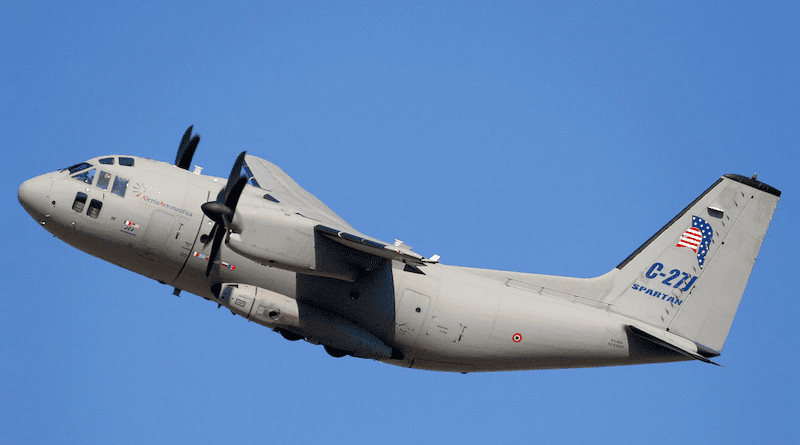Azerbaijan To Buy Italian Military Aircraft
By Eurasianet
By Joshua Kucera*
(Eurasianet) — Azerbaijan has reached an agreement to buy Italian military aircraft, a rare arms deal with a Western country that was borne out of increasing energy cooperation between Baku and Rome.
Italian defense giant Leonardo announced on June 8 that it had reached an agreement with Azerbaijan’s Defense Ministry for the purchase of C-27J military transport aircraft. Unusually, the partially state-owned Leonardo explicitly tied the deal to energy ties: “Initially linked to the energy sectors, the collaboration between Italy and Azerbaijan is now also extended to defence industry products,” the company wrote in its press release.
Italy has emerged as Azerbaijan’s main energy customer in Europe. The Southern Gas Corridor network of pipelines, which ships natural gas west from the Caspian Sea, terminates in Italy. And Italy is also Azerbaijan’s largest oil buyer in Europe by far: Azerbaijan’s State Customs Committee recently reported that more than half of the country’s oil sales in Europe went just to Italy.
“Talks between the defense ministries of the two countries to reach the [C-27J] deal reflects Italy’s growing use of government-to-government negotiations to sell products produced by state controlled firms Leonardo and Fincantieri,” wrote industry publication Defense News.
Until now there have been nearly no arms sales from Western countries to Azerbaijan or its rival, Armenia.
The Organization for Security and Cooperation in Europe (OSCE) requested that member states impose arms embargoes against both Armenia and Azerbaijan in 1992, during the first war between the two sides. The embargo request remains in effect.
That non-mandatory embargo has been far from airtight: OSCE member Russia remains Armenia’s largest arms supplier and was Azerbaijan’s until the mid-2010s. In the Azerbaijani market, Russia has since been supplanted by Turkey – also an OSCE member – and Israel.
But the embargo has discouraged sales by other member states. Data from the Stockholm International Peace Research Institute indicates only a handful of minor sales from Western-aligned European countries to Azerbaijan in recent years: one Spanish radar and a controversial, under-the-table export of Czech and Slovak howitzers and rocket launchers via Israel.
When reports came out that Armenia acquired French-German anti-tank missiles in 2013, Azerbaijan objected, citing the OSCE embargo. (The reports turned out to not be true.)
As Armenia’s relations with Russia have faltered and Armenian officials have reported interruptions in arms supplies to the country, Yerevan has begun looking elsewhere for its weaponry. There have been talks with OSCE member France, though they have yet to bear any fruit; talks with India have gone farther.
There has been no comment from Azerbaijan’s government on the C-27J sale, though its defense ministry reported that Deputy Minister of Defense, Agil Gurbanov, head of the Main Department for Military-Technical Support Agil Gurbanov, was in Rome and met Italian Defense Minister Guido Crosetto on June 7.
It’s not clear what missions Azerbaijan might have in mind for the aircraft. Leonardo describes them as “the ideal aircraft for military transport missions, airdrops of paratroopers and materials, ‘last mile’ tactical troop support, special forces operations, humanitarian assistance and disaster relief.” The press release did not specify how many aircraft Azerbaijan would be buying.
Azerbaijan is currently known to operate two military transport aircraft, the strategic airlifter Russian Il-76s, considerably bigger and intended for longer-range missions than the tactical C-27J.
While the aircraft can be used for civilian missions Azerbaijan is most likely to use them in a military role, for transport of materiel, ammunition, and personnel, analyst Fuad Shahbaz told Eurasianet.
Joshua Kucera, a senior correspondent, is Eurasianet’s former Turkey/Caucasus editor and has written for the site since 2007.

